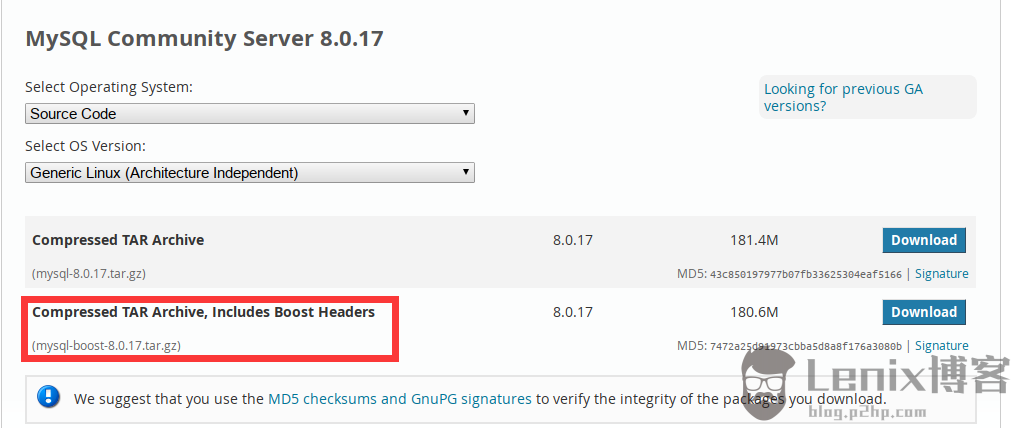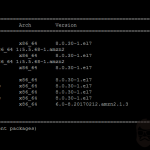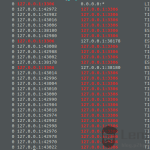提示下,编译MySQL 8.0版本,需要gcc版本5.3.0以上才行。我这次的编译环境是ubuntu 18.04,其gcc版本是7.4。
首先,下载带boost代码的MySQL源码包,在官网下载页面有相应的提示:

解压缩后,就可以开始编译了。首先,指定编译的选项:
[root@ubuntu]# cd /opt/src/mysql-8.0.17/
cmake . \
-DWITH_BOOST=/opt/mysql-8.0.17/boost/ \
-DCMAKE_INSTALL_PREFIX=/usr/local/mysql-8.0.17 \
-DMYSQL_DATADIR=/data/mysql \
-DWITHOUT_CSV_STORAGE_ENGINE=1 \
-DWITHOUT_BLACKHOLD_STORAGE_ENGINE=1 \
-DWITHOUT_FEDERATED_STORAGE_ENGINE=1 \
-DWITHOUT_ARCHIVE_STORAGE_ENGINE=1 \
-DWITHOUT_NDBCLUSTER_STORAGE_ENGINE=1 \
-DFORCE_INSOURCE_BUILD=1 \
-DCMAKE_CXX_COMPILER=/usr/local/bin/g++ \
-DCMAKE_C_COMPILER=/usr/local/bin/gcc在上面的参数中,我把不常用的引擎直接给禁用了,读者们若有需要个别引擎可自行删除对应选项即可。而DEBUG、SSL等几个选项则建议不要禁用。 …
接下来就是执行 make && make install ,顺利的话就完成编译并安装了。如果编译错误,则删除CMakeCache.txt文件后解决对应错误,重新编译即可。
编译完后看到的MySQL版本号就是这样的了:
[root@ubuntu]# /usr/local/mysql-8.0.17/bin/mysqld --verbose -V
/usr/local/mysql-8.0.17/bin/mysqld Ver 8.0.17 for Linux on x86_64 (Source distribution)
有没有感觉有点酷酷的,嘿。
添加mysql用户 :
shell> groupadd mysql8
shell> useradd -r -g mysql8 -s /bin/false mysql8
初始化数据:
sudo /usr/local/mysql-8.0.17/bin/mysqld --defaults-file=/etc/mysql/mysql8.conf.d/mysqld.cnf --pid-file=/var/run/mysqld8/mysqld.pid --initialize-insecure --user=mysql8
#使用时--initialize-insecure,不会root生成密码. 使用--initialize了 “ 默认安全 ”安装(即包括生成随机初始的 root密码)。在这种情况下,密码标记为已过期,您需要选择一个新密码。
启动mysql
sudo /usr/local/mysql-8.0.17/bin/mysqld --defaults-file=/etc/mysql/mysql8.conf.d/mysqld.cnf --daemonize --pid-file=/var/run/mysqld8/mysqld.pid
附 mysql 8.0 的my.cnf配置
# # The MySQL database server configuration file. # # You can copy this to one of: # - "/etc/mysql/my.cnf" to set global options, # - "~/.my.cnf" to set user-specific options. # # One can use all long options that the program supports. # Run program with --help to get a list of available options and with # --print-defaults to see which it would actually understand and use. # # For explanations see # http://dev.mysql.com/doc/mysql/en/server-system-variables.html # This will be passed to all mysql clients # It has been reported that passwords should be enclosed with ticks/quotes # escpecially if they contain "#" chars... # Remember to edit /etc/mysql/debian.cnf when changing the socket location. # Here is entries for some specific programs # The following values assume you have at least 32M ram [mysqld_safe] socket = /var/run/mysqld8/mysqld.sock nice = 0 [mysqld] #skip-grant-tables # # * Basic Settings # user = mysql8 pid-file = /var/run/mysqld8/mysqld.pid socket = /var/run/mysqld8/mysqld.sock port = 3308 #我这里是多个版本共存,这里用的是3308,如果你只有一个版本,可以用3306 basedir = /usr/local/mysql-8.0.17 datadir = /home/mysql8 #datadir = /data/mysql tmpdir = /tmp lc-messages-dir = /usr/local/mysql-8.0.17/share skip-external-locking character-set-server=utf8mb4 collation-server=utf8mb4_general_ci #language = /usr/local/mysql-8.0.17/share/english # # Instead of skip-networking the default is now to listen only on # localhost which is more compatible and is not less secure. bind-address = 127.0.0.1 # # * Fine Tuning # key_buffer_size = 16M max_allowed_packet = 16M thread_stack = 192K thread_cache_size = 8 # This replaces the startup script and checks MyISAM tables if needed # the first time they are touched myisam-recover-options = BACKUP #max_connections = 100 #table_open_cache = 64 #thread_concurrency = 10 # # * Query Cache Configuration # # # * Logging and Replication # # Both location gets rotated by the cronjob. # Be aware that this log type is a performance killer. # As of 5.1 you can enable the log at runtime! general_log_file = /var/log/mysql8/mysql8.log #general_log = 1 # # Error log - should be very few entries. # log_error = /var/log/mysql8/error8.log # # Here you can see queries with especially long duration #slow_query_log = 1 #slow_query_log_file = /var/log/mysql/mysql-slow.log #long_query_time = 2 #log-queries-not-using-indexes # # The following can be used as easy to replay backup logs or for replication. # note: if you are setting up a replication slave, see README.Debian about # other settings you may need to change. #server-id = 1 log_bin = /var/log/mysql8/mysql8-bin.log binlog_expire_logs_seconds=140000 max_binlog_size = 100M #binlog_do_db = include_database_name #binlog_ignore_db = include_database_name # # * InnoDB # # InnoDB is enabled by default with a 10MB datafile in /var/lib/mysql/. # Read the manual for more InnoDB related options. There are many! # # * Security Features # # Read the manual, too, if you want chroot! # chroot = /var/lib/mysql/ # # For generating SSL certificates I recommend the OpenSSL GUI "tinyca". # # ssl-ca=/etc/mysql/cacert.pem # ssl-cert=/etc/mysql/server-cert.pem # ssl-key=/etc/mysql/server-key.pem
参考
- 2.9.4 MySQL Source-Configuration Options,https://dev.mysql.com/doc/refman/8.0/en/source-configuration-options.html
- Installing Percona Server for MySQL 8.0.15-5,https://www.percona.com/doc/percona-server/5.7/installation.html
- Centos7升级gcc学习笔记 https://www.cnblogs.com/highway-9/p/5628852.html
- https://dev.mysql.com/doc/refman/8.0/en/data-directory-initialization.html
- http://imysql.com/2019/05/04/%e7%8e%a9%e8%bd%acmysql-8-0%e6%ba%90%e7%a0%81%e7%bc%96%e8%af%91.shtml
原创文章,转载请注明:来自Lenix的博客,地址 https://blog.p2hp.com/archives/6618







